沪教版小学英语语法及练习上课讲义
沪教版本英语小学四年级的第二学期语法学习知识点归类.docx

沪教版本英语小学四年级的第二学期语法学习知识点归类.docx4B 语法知识点复习1.量的用法There is a glass of watermelon juice.There are three glasses of strawberry juice.2.疑句和一般疑句的区(1)一般疑句 Is the kite red and blue?(筝是色的?)一般疑句的回答必 Yes 或 No 开Yes, it is./No, it isn’ t.(2)疑句 Is the kite red or blue?(筝是色是色?)疑句的回答必是二一:It ’ s red. It 或’ s blue.3.关于 like 后面接不同的名和like apples / like green ones(可数名复数)like the apple / like the green one (可数名数)like jelly(不可数名)like dancing=like to dance()would like to dance(would like to do=want to do)be like me/her/his father?(解像,作介)4.感句What nice grapes!(复数)What a nice girl!(单数)5.whose对所有格提问Whose bag isthis? -----It ’s peter ’ s. (this/that 回答用it ’ s )Whose knives arethose?-----They arehis knives. ( these/those回答用they ’ re )6.so 和 too 解释为如此、太时后面跟形容词It ’ s sothick. /He is so puzzled.It ’ s toonoisy.7.How+ 助动词 + 主语 + 动词The pineapple is rough.(划线提问)How does the pineapple feel?This cherry is sweet.(划线提问)How does this cherry taste?8.祈使句和can 句型永远用动词原形,即使有now,也不能是进行时祈使句Let ’ smakea card now.Kitty, don ’t put your book on the floor.(否定句在动词前加don ’ t )can句型Can Lucyread the book now?(容易犯的错误:看见Lucy 一个人就用三单reads,或看见 now 用进行时)9. There be就近原则,后面所接词必须看清是否是可数名词从而确定be 动词There is a cat and two dogs.(离得近的是数)There are two dogs and a cat. (离得近的是复数)There is somepaper.(不可数)There are some paperrabbits. (前面有修的名复数)There are some sheep.(复数相同)There is somestring.(不可数)There is a lot of applejuice.(前面有修的不可数)10.both 和 all 放在 be 之后, do 之前We are both tall.(be之后)They are all blind.(be之后)We both run fast.(do之前)The brothers all touch the elephant(. do 之前)11.one of the 复数,三One of the boys is Tom.say one of the brothers12.一般和行的区行:当句子里有志性的如now,look,listen,it ’ s ?几点(祈使句和can句型除外),或是某个有上下情景的句子表示个作在正在生,构be+doingListen, birdsare singing.Where ’ s Sam? Heis playingfootball outside.一般:当句子里有志性的如every morning, on Moday, at weedends, always, usually, often, sometimes,never,at ?几点等,表示述某个事。
二年级沪教版必备英语全解讲义

二年级沪教版必备英语全解讲义Unit 1 - GreetingsIn this unit, students will learn basic greetings in English and how to introduce themselves.Lesson 1: Hello!Objective: To greet someone appropriately in English.1. Greet the students: Good morning/afternoon, class!- Students respond: Good morning/afternoon, teacher!2. Introduce the topic: Today, we will learn how to greet each other in English.3. Teach basic greetings:- Hello, hi, good morning, good afternoon.- Model pronunciation and encourage students to repeat after you.4. Practice greetings:- Divide the class into pairs.- Instruct students to greet each other using different greetings.- Monitor and provide feedback.5. Wrap up the lesson:- Ask students to share their experiences and feelings about greeting in English.Lesson 2: Introducing YourselfObjective: To introduce oneself in English.1. Review greetings from the previous lesson.- Ask students to greet their classmates using the different greetings.2. Introduce the topic: Today, we will learn how to introduce ourselves in English.3. Teach self-introductions:- My name is [name].- Model pronunciation and encourage students to practice.4. Practice self-introductions:- Divide the class into small groups.- Instruct students to take turns introducing themselves.- Encourage students to ask follow-up questions to their classmates.- Monitor and provide feedback.5. Wrap up the lesson:- Have students present their introductions to the whole class.Unit 2 - Colors and NumbersIn this unit, students will learn how to identify and describe colors and numbers in English.Lesson 1: ColorsObjective: To identify and describe colors in English.1. Review greetings and self-introductions from the previous unit.- Ask students to greet and introduce themselves to their classmates.2. Introduce the topic: Today, we will learn about colors in English.3. Teach colors vocabulary:- Show flashcards or real objects representing different colors.- Say the color name and encourage students to repeat after you.- Practice pronunciation and identification.4. Practice using colors:- Show objects of different colors.- Instruct students to name the color of the object they see.- Encourage students to form simple sentences using colors, e.g., "The sky is blue."5. Wrap up the lesson:- Conduct a group activity where students have to find objects of different colors in the classroom.Lesson 2: NumbersObjective: To count and recognize numbers in English.1. Review colors from the previous lesson.- Ask students to name objects of different colors in the classroom.2. Introduce the topic: Today, we will learn about numbers in English.3. Teach numbers vocabulary:- Show flashcards or write numbers on the board.- Say the numbers and encourage students to repeat after you.- Practice pronunciation and recognition.4. Practice counting and using numbers:- Point to different objects and have students count them in English.- Instruct students to form simple sentences using numbers, e.g., "I have three pencils."5. Wrap up the lesson:- Play a counting game where students have to count objects or clap their hands based on the given number.Unit 3 - Daily ActivitiesIn this unit, students will learn how to talk about their daily activities in English.Lesson 1: Daily ActivitiesObjective: To learn vocabulary related to daily activities.1. Review numbers from the previous unit.- Ask students to count objects or complete number patterns.2. Introduce the topic: Today, we will learn how to talk about our daily activities in English.3. Teach vocabulary related to daily activities:- Show flashcards or use pictures to represent different activities.- Say the activity name and encourage students to repeat after you.- Practice pronunciation and recognition.4. Practice discussing daily activities:- Instruct students to share their daily routines with a partner.- Encourage students to ask questions and have a conversation using the target vocabulary.5. Wrap up the lesson:- Have students present their daily routines to the whole class.Lesson 2: Telling TimeObjective: To learn how to tell time in English.1. Review daily activities from the previous lesson.- Ask students to share their favorite activities with the class.2. Introduce the topic: Today, we will learn how to tell time in English.3. Teach vocabulary related to time:- Show flashcards or use clock visuals to represent different times.- Say the time and encourage students to repeat after you.- Practice pronunciation and recognition.4. Practice telling time:- Instruct students to work in pairs and take turns asking and answering questions about the time.- Provide support and feedback as needed.5. Wrap up the lesson:- Play a time-telling game where students have to match clocks with the corresponding time.Conclusion:These comprehensive teaching notes serve as a guide for teaching second-grade students using the Shanghai Education Edition (沪教版) English textbook. The provided lessons cover topics such as greetings, self-introductions, colors, numbers, daily activities, and telling time. By engaging students in interactive activities, teachers can help them develop their English language skills effectively.。
上海沪教版小学英语语法系统复习资料_A
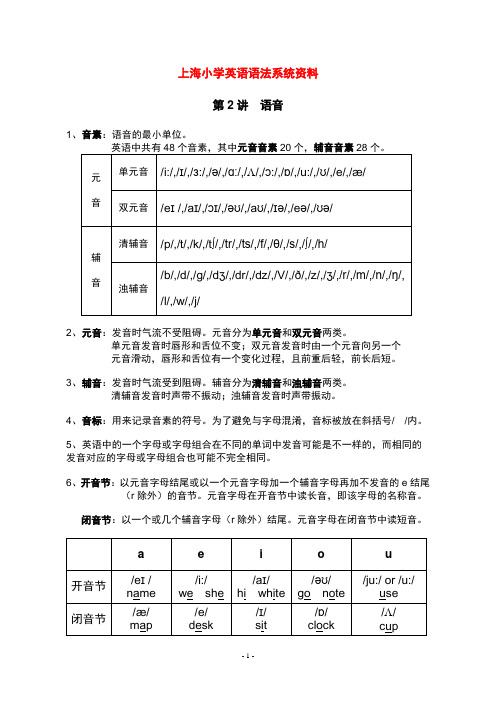
上海小学英语语法系统资料
第2讲语音
1、音素:语音的最小单位。
2、元音:发音时气流不受阻碍。
元音分为单元音和双元音两类。
单元音发音时唇形和舌位不变;双元音发音时由一个元音向另一个
元音滑动,唇形和舌位有一个变化过程,且前重后轻,前长后短。
3、辅音:发音时气流受到阻碍。
辅音分为清辅音和浊辅音两类。
清辅音发音时声带不振动;浊辅音发音时声带振动。
4、音标:用来记录音素的符号。
为了避免与字母混淆,音标被放在斜括号/ /内。
5、英语中的一个字母或字母组合在不同的单词中发音可能是不一样的,而相同的发音对应的字母或字母组合也可能不完全相同。
6、开音节:以元音字母结尾或以一个元音字母加一个辅音字母再加不发音的e结尾
(r除外)的音节。
元音字母在开音节中读长音,即该字母的名称音。
闭音节:以一个或几个辅音字母(r除外)结尾。
元音字母在闭音节中读短音。
沪教版五年级上册英语Unit 8 An outing讲义(教师版)
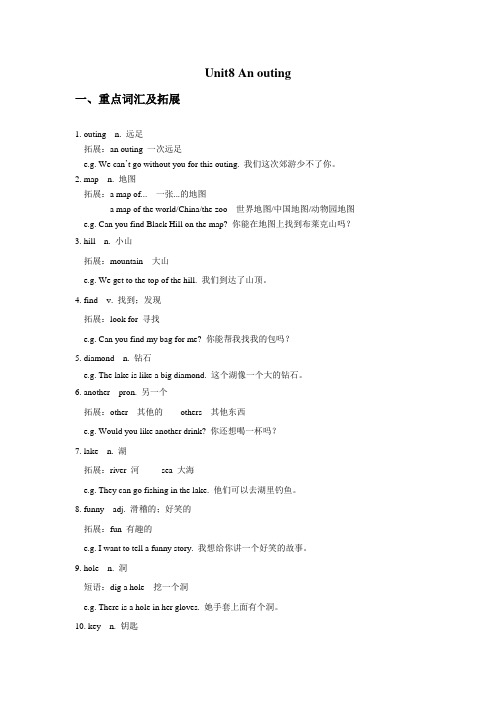
Unit8 An outing一、重点词汇及拓展1. outing n. 远足拓展:an outing 一次远足e.g. We can’t go without you for this outing. 我们这次郊游少不了你。
2. map n. 地图拓展:a map of... 一张...的地图a map of the world/China/the zoo 世界地图/中国地图/动物园地图e.g. Can you find Black Hill on the map? 你能在地图上找到布莱克山吗?3. hill n. 小山拓展:mountain 大山e.g. We get to the top of the hill. 我们到达了山顶。
4. find v. 找到;发现拓展:look for 寻找e.g. Can you find my bag for me? 你能帮我找我的包吗?5. diamond n. 钻石e.g. The lake is like a big diamond. 这个湖像一个大的钻石。
6. another pron. 另一个拓展:other 其他的others 其他东西e.g. Would you like another drink? 你还想喝一杯吗?7. lake n. 湖拓展:river 河sea 大海e.g. They can go fishing in the lake. 他们可以去湖里钓鱼。
8. funny adj. 滑稽的;好笑的拓展:fun 有趣的e.g. I want to tell a funny story. 我想给你讲一个好笑的故事。
9. hole n. 洞短语:dig a hole 挖一个洞e.g. There is a hole in her gloves. 她手套上面有个洞。
10. key n. 钥匙短语:a set of keys 一串钥匙the key to the door 门的钥匙e.g. They put the key in the door and come into the classroom. 他用钥匙开了门然后走了进去。
沪教版五年级上册英语Unit 12 Fire讲义(教师版)

Unit 12 Fire一、重点词汇及拓展1. fire n. 火;火灾短语:put out fires 灭火make the fire 生火e.g. Most animals are afraid of fire. 大多数动物怕火。
2. burn v. 燃烧;烧拓展:burning adj. 烧着的短语:burn down 烧毁e.g. How do you burn your feet? 你的脚怎么烧伤的?3. hurt v.(使)受伤短语:get hurt 受伤e.g. Do you hurt yourself? 你伤到自己了吗?4. must v. 必须(情态动词)拓展:mustn’t 禁止;不许e.g. I must telephone my parents. 我一定要给父母打电话。
5. careful adj. 小心的拓展:carefully adv. 小心地短语:be careful! 小心!be careful with sth/sb 当心...e.g. Be careful, the plates are hot. 小心,盘子烫手。
6. safety n. 安全拓展:safe adj. 安全的dangerous adj. 危险的danger n. 危险短语:safety first 安全第一e.g. Safety is important. 安全至上。
7. smoke v. 吸烟n. 烟;烟雾拓展:smoky adj. 烟雾弥漫的短语:Don’t smoke!=No smoking! 禁止吸烟!e.g. He doesn’t smoke or drink. 他不吸烟不喝酒。
8. match n. 火柴(复数:matches);比赛v. 匹配拓展:play with matches 玩火柴e.g. The match lights easily. 这火柴容易点燃。
9. heat n. 热;高温e.g. The heat makes him feel bad. 高温使他觉得难受。
沪教版六年级上册英语Unit 3 Healthy or unhealthy讲义(教师版)
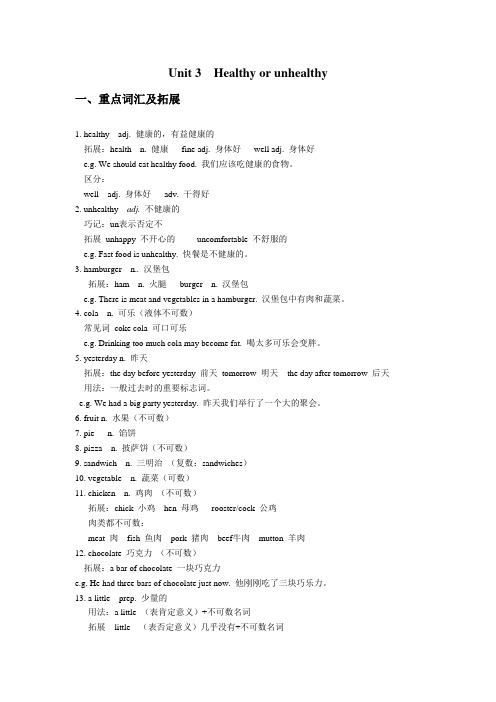
Unit 3 Healthy or unhealthy一、重点词汇及拓展1. healthy adj. 健康的,有益健康的拓展:health n. 健康fine adj. 身体好well adj. 身体好e.g. We should eat healthy food. 我们应该吃健康的食物。
区分:well adj. 身体好adv. 干得好2. unhealthy adj.不健康的巧记:un表示否定不拓展unhappy 不开心的uncomfortable 不舒服的e.g. Fast food is unhealthy. 快餐是不健康的。
3. hamburger n..汉堡包拓展:ham n. 火腿burger n. 汉堡包e.g. There is meat and vegetables in a hamburger. 汉堡包中有肉和蔬菜。
4. cola n. 可乐(液体不可数)常见词coke cola 可口可乐e.g. Drinking too much cola may become fat. 喝太多可乐会变胖。
5. yesterday n.昨天拓展:the day before yesterday 前天tomorrow 明天the day after tomorrow 后天用法:一般过去时的重要标志词。
e.g. We had a big party yesterday. 昨天我们举行了一个大的聚会。
6. fruit n. 水果(不可数)7. pie n. 馅饼8. pizza n. 披萨饼(不可数)9. sandwich n. 三明治(复数:sandwiches)10. vegetable n. 蔬菜(可数)11. chicken n. 鸡肉(不可数)拓展:chick 小鸡hen 母鸡rooster/cock 公鸡肉类都不可数:meat 肉fish 鱼肉pork 猪肉beef牛肉mutton 羊肉12. chocolate 巧克力(不可数)拓展:a bar of chocolate 一块巧克力e.g. He had three bars of chocolate just now. 他刚刚吃了三块巧乐力。
沪教版五年级上册英语Unit4 Grandparents讲义
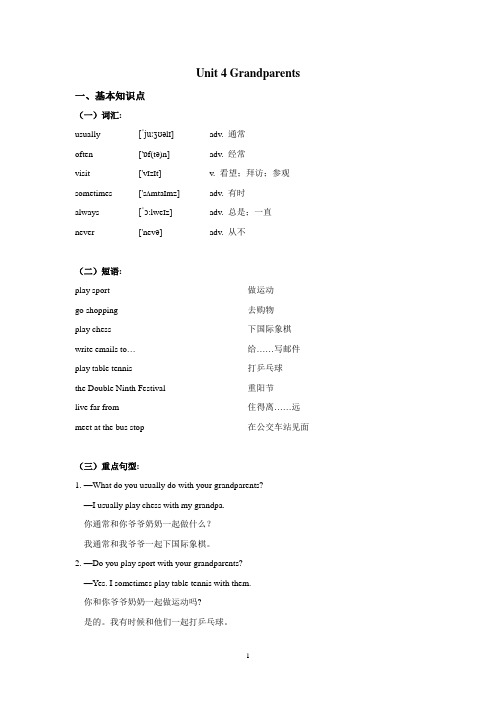
Unit 4 Grandparents 一、基本知识点(一)词汇:usually [ˈjuːʒʊəlɪ] adv. 通常often ['ɒf(tə)n] adv. 经常visit ['vɪzɪt] v. 看望;拜访;参观sometimes ['sʌmtaɪmz] adv. 有时always [ˈɔ:lweɪz] adv. 总是;一直never ['nevə] adv. 从不(二)短语:play sport 做运动go shopping 去购物play chess 下国际象棋write emails to…给……写邮件play table tennis 打乒乓球the Double Ninth Festival 重阳节live far from 住得离……远meet at the bus stop 在公交车站见面(三)重点句型:1. —What do you usually do with your grandparents?—I usually play chess with my grandpa.你通常和你爷爷奶奶一起做什么?我通常和我爷爷一起下国际象棋。
2. —Do you play sport with your grandparents?—Yes. I sometimes play table tennis with them.你和你爷爷奶奶一起做运动吗?是的。
我有时候和他们一起打乒乓球。
3. We like going to the park together.我们喜欢一起去公园。
(四)语法:1. 频率副词的用法:(1) 频率副词有:always, usually, often, sometimes, never。
(2) 是一般现在时的时态标志词。
(3) 位置:在句子中,用在系动词之后,行为动词之前。
e.g. He is always happy.I usually play chess with my grandpa.(五)重难点、易错点:1. 频率副词的位置:(1)系动词之后(2)实义动词之前2. 频率副词在特殊疑问句和一般疑问句中的应用:(1) —What do you usually do with your grandparents?—I usually play chess with my grandpa.(2) —Do you play sport with your grandparents?—Yes. I sometimes play table tennis with them.二、典型例题1. I sometimes play guitar after school.A. aB. theC. /【解析】答案:B。
沪教版五年级上册英语Unit 5 Friends讲义(教师版)
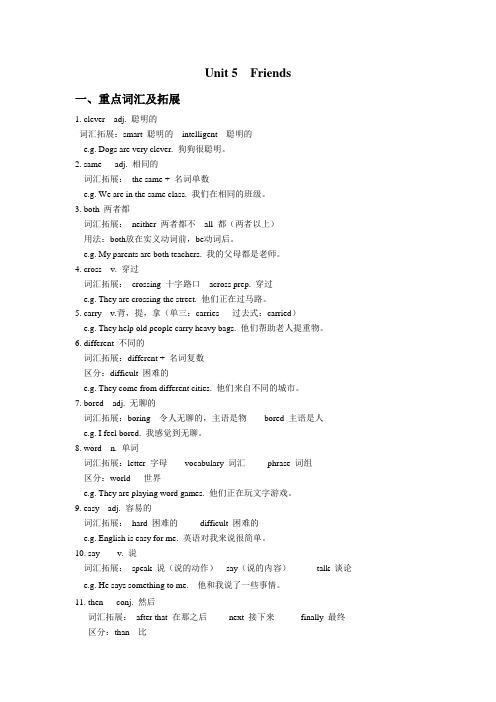
Unit 5 Friends一、重点词汇及拓展1. clever adj. 聪明的词汇拓展:smart 聪明的intelligent 聪明的e.g. Dogs are very clever. 狗狗很聪明。
2. same adj. 相同的词汇拓展:the same + 名词单数e.g. We are in the same class. 我们在相同的班级。
3. both 两者都词汇拓展:neither 两者都不all 都(两者以上)用法:both放在实义动词前,be动词后。
e.g. My parents are both teachers. 我的父母都是老师。
4. cross v. 穿过词汇拓展:crossing 十字路口across prep. 穿过e.g. They are crossing the street. 他们正在过马路。
5. carry v.背,提,拿(单三:carries 过去式:carried)e.g. They help old people carry heavy bags. 他们帮助老人提重物。
6. different 不同的词汇拓展:different + 名词复数区分:difficult 困难的e.g. They come from different cities. 他们来自不同的城市。
7. bored adj. 无聊的词汇拓展:boring 令人无聊的,主语是物bored 主语是人e.g. I feel bored. 我感觉到无聊。
8. word n. 单词词汇拓展:letter 字母vocabulary 词汇phrase 词组区分:world 世界e.g. They are playing word games. 他们正在玩文字游戏。
9. easy adj. 容易的词汇拓展:hard 困难的difficult 困难的e.g. English is easy for me. 英语对我来说很简单。
沪教版六年级上册英语Unit 5 Animals in danger讲义(教师版)

Unit 5 Animals in danger一、重点词汇及拓展1. thousand n.千词汇拓展:five thousand 五千thousands of 成千上万e.g. There are only about one thousand pandas in the wild. 在野外大概有一千只熊猫。
2. hundred n.百词汇拓展:three hundred 三百hundreds of 成百上千e.g. Hundreds of people went for a trip during the holiday. 成百上千的人们在假期期间旅游。
3.wild adj.野生的,野生环境n.野外词汇拓展:wildlife 野生动植物in the wild 在野外e.g. Wild animals are in danger. 野生动物在危险中。
4. South China tiger n.华南虎e.g. There are only a few South China tiger now. 现在仅仅有极少数的华南虎。
5. blue whale n.蓝鲸e.g. Blue whales are the largest animals. 蓝鲸是最大的动物。
6.way n. 路方法方式词汇拓展:highway 公路大路subway 地铁waterway 水路航路on one’s way home 在某人回家的路上e.g. I met him on my way home. 我回家的路上遇见了他。
7.die v. 死,死亡词汇拓展:death n. 死亡过去式died 现在分词dyinge.g. A year later, his dog died. 一年后他的狗死了。
8. rhino n.犀牛词汇拓展:rhino 或rhinose.g. It’s a black baby rhino. 那是一只黑色的犀牛宝宝。
沪教版五年级下册英语期末复习(课本知识点+语法分类+配套练习)

5B期末课本复习Module1Unit 1 日常用语What a mess! What should I do? Whose ball is this? It is Miss Fang ‘s. Are those books hers too?Put all her books on her desk.Can you put it in the box? They are my gloves; these gloves are for my hands.The box falls onto the floor. Be careful. The nails are sharp. Jim’s father gives him a black stone.It is hard and smooth. All the nails stick to the stone. Soon the floor cleans again.Unit 2日常用语Do you know how a …… ?But now I am a butterfly ,flying high in the bright blue sky . First ……Next……Then….. Finally……A butterfly is an interesting insect. It was a white egg, now it is a green caterpillar. It likes eating leaves.It was a brown cocoon, now it is a beautiful blue butterfly. I put the silkworms on the leaves. The silkworms are small, now they are big, they can make a lot of silk.The cocoons open ,five silkworms come out. They can lay eggs. Caterpillars like eating leaves. Once I was a baby ,crying in my bed . But now I am big and tall, playing happily with my football.It is born in a river, it is black and small. Your mum has big eyes and mouth and she can catch flies. Unit 3日常用语It is too noisy outside. She heard another noise . Ben did not like it at all. Sometimes it is so noisy .It was Saturday afternoon ,kitty was at home ,she wants to read a book. But it was too noisy outside. Finally, it was quiet. They sat on the sofa and watched a cartoon.What noise can you hear around you?There was a pop group at City Square. They played some loud music.Ben enjoyed the loud music very much, he had great time.Kitty wants to play some loud music for Ben .My city is a noisy place, with all the cars and buses. My city is a noisy place, but it’s not loud everywhere.I love going to the library to read the good books here.On Sunday morning ,it’s always nice and quiet, I can hear the birds singing.The kings birthday is coming.He wants to listen the loudest noise in the world, so all the people must shout together at 12 o’clock. On his birthday.All the people hear about his idea. At 12 o’clock. On the king’s birthday, people all open their mouths and listen.They hear the songs of the birds and the river. After that people do everything quietly.Module2Unit1 重点句型What did you have for breakfast this morning ? I had ……Breakfast is very important . We should eat breakfast every morning .…… is /are my favourite food /breakfast .An apple a day keeps the doctor away .What happens to you ?= what's wrong with you ?= what is up /matter withe you ?Unhealthy children eat a lot of sweets, hamburgers , ice cream and chocolates, they drink a lot of soft drinks.Unhealthy children do not play sport very often , they watch too much TV and eat too much sweet food .Healthy children like running ,jumping ,and playing , they eat a lot of fruit ,vegetables and some meat.Matte eats all day and night ,soon he becomes very fat .Unit 2重点句子Here we are. Be quick.Shall we go to see a film this evening ? Which film do you want to see ?That’s 80 yuan,please. It’s on at two o’ clock.Can I have three ticket for Snow White , please ?--Can I have a cup of tea ,please ? --Yes, you can . Here you are.Let’s leave at one thirty .That’s a good idea ! All right!The film starts in five minutes. Let me buy the ticket first.Who is the fairest of all? She looks like an old woman .The hunter takes Snow White into a forest and let her go.Shall I help you carry your bag ?Unit 3重点句子What classes do we have today ? We have Chinese, Maths , Art and IT in the morning.What is your favourite subject ?There is a short break after each class. It’s time for Chinese class .In PE class we have great fun . What do you think ,Danny?Thanks for your help , Danny! This is my timetable for today .At school we learn thing every day . In Maths class we count from one to ten.He draws some lines and dots on the paper. Peter looks at his paper carefully.Maybe I will draw a house in the rain. It needs some colour .He colours his picture.Module3Unit1日常用语You can’t ride here. Look at the sign. You can't walk your dog here. No smoking/swimming.They are sitting on the bench. The park keeper comes. Don't litter/throw rubbish .Don't walk on the grass.What does this sign mean/say? It means/says we can’t swim.We want to have a picnic in the park.I want to pick some beautiful flowers. She said to herself. He put some stones into his pocket. On the way to the forest ,he dropped the stones. We are lost. Don't worry. We can follow the stones back home .I’ll come back.Unit2常用语It will be windy tonight.How is the weather today? =What is the weather like today ?What is the temperature today? It is 30 degrees.What day is today? It is Sunday .What is the date today? It is 1st of May.What is your favourite season? I love summer.We had a hot and sunny day yesterday.We will have heavy rain and a strong wind tomorrow. I like the rain ,it helps my plants grow.I don't like the wind ,it blows my plants down. I like the sun ,it makes my plants strong.A typhoon is coming from the East China Sea . I don't like hot weather at all. In summer there is a lot of rain ,the plants grow quickly. It is warm and comfortable in house in winter.询问天气特殊疑问句:问今天的天气:What is the weather like today ?It is windy and sunny.What is the temperature today? It is 28 degrees问昨天的天气:What was the weather like yesterday ?It was hot.What was the temperature today? It was 32 degrees.问明天的天气:What will the weather be like tomorrow? It will be windy tonight.unit 3日常用语Let’s give him a surprise.What can we do?Let's move the furniture. Yes, let’s do that.We can put the table next to the wall.What is different? What else?I c an’t remember. The sofa was under the shelf , now it is next to the shelf.You are right. Where was it ? Many years ago , Shanghai was a mall village . Not many people lived here. Many of them were fishermen and farmers. Later ,people from other places came to Shanghai and it became a town. There are a lot of tall buildings. There are a lot of photos of old Shanghai. What can you see in the Shanghai History Museum?What was Shanghai like many years ago?Module4Unit1重要句型:1.He can... 2.Which museum do you want ...?3.Why?Because...4.What did you...?语法:1.情态动词 2.一般过去时 3.特殊疑问句What did you see there? Which museum do you want to visit?Unit2重要句型:1.When's...It's on... 2.What do you do at...3.We usually...4.What's your favourite...语法: 1.一般现在时 2.特殊疑问句What's your favourite holiday?Unit3重点句型:Both...and.. .do not ....either5B期末归类复习一、代词人称代词主格:作主语,表示谁怎么样了、干什么了。
沪教版六年级上册英语Unit 10 Air讲义(教师版)

Unit10 Air一、重点词汇及拓展1. air n. 空气v. 通风拓展:air the room 给房间通风e.g. Let’s go out for some fresh air. 让我们出去呼吸点新鲜空气。
2. everywhere prep. 处处,到处(=here and there)拓展:somewhere 某个地方anywhere 任何地方nowhere 没有地方e.g. I see her pictures everywhere. 我到处看到她的照片。
3. alive adj. 活着的拓展:live 居住短语:keep...alive 让...活着e.g. Is your mother still alive? 你的母亲还健在吗?4. balloon n. 气球e.g. His father buys him a balloon. 他爸爸给他买了一个气球。
5. factory n. 工厂拓展:复数:factories company 公司e.g. My father works in a toy factories. 我的爸爸在一家玩具公司工作。
6. smoke n. 烟v. 抽烟拓展:smoky adj. 烟雾缭绕的cigarette n. 香烟No smoking!禁止抽烟!e.g. He doesn’t smoke or drink. 他不抽烟,也不喝酒。
7. dirty adj. 脏的e.g. Don’t get your dress dirty. 别把你的连衣裙弄脏了。
8. clean adj. 干净的;洁净的拓展:tidy adj. 整洁的e.g. Cats are very clean animals. 猫是非常干净的动物。
9. hurt v. 感到痛拓展:hurt-hurt(过去式)e.g. Do you hurt yourself? 你伤到自己了吗?10. fresh adj. 清新的;新鲜的短语:fresh fruit 新鲜水果e.g. Is the milk fresh? 这牛奶新鲜吗?11. plant v. 种植n. 植物短语:plant trees 植树Tree Planting Day 植树节(3月12日)e.g. We should plant more trees to make our city clean.我门应该植更多的树让我们的城市变得干净。
沪教版五年级上册英语Unit 6 Family life讲义(教师版)
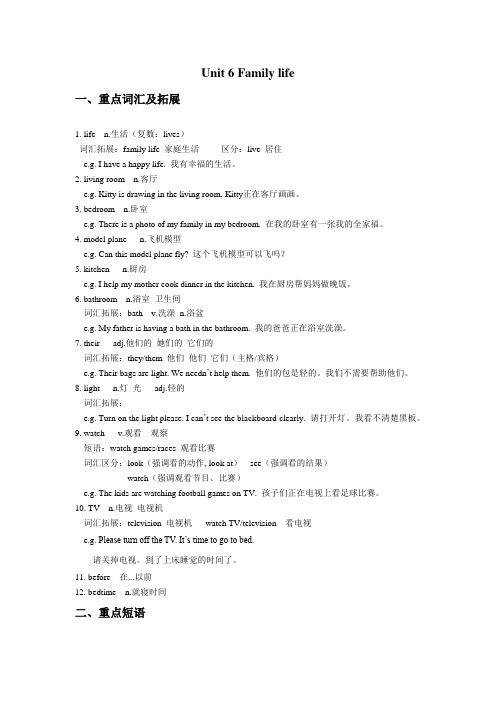
Unit 6 Family life一、重点词汇及拓展1. life n.生活(复数:lives)词汇拓展:family life 家庭生活区分:live 居住e.g. I have a happy life. 我有幸福的生活。
2. living room n.客厅e.g. Kitty is drawing in the living room. Kitty正在客厅画画。
3. bedroom n.卧室e.g. There is a photo of my family in my bedroom. 在我的卧室有一张我的全家福。
4. model plane n.飞机模型e.g. Can this model plane fly? 这个飞机模型可以飞吗?5. kitchen n.厨房e.g. I help my mother cook dinner in the kitchen. 我在厨房帮妈妈做晚饭。
6. bathroom n.浴室卫生间词汇拓展:bath v.洗澡n.浴盆e.g. My father is having a bath in the bathroom. 我的爸爸正在浴室洗澡。
7. their adj.他们的她们的它们的词汇拓展:they/them 他们他们它们(主格/宾格)e.g. Their bags are light. We needn’t help them. 他们的包是轻的。
我们不需要帮助他们。
8. light n.灯光adj.轻的词汇拓展:e.g. Turn on the light please. I can’t see the blackboard clearly. 请打开灯。
我看不清楚黑板。
9. watch v.观看观察短语:watch games/races 观看比赛词汇区分:look(强调看的动作, look at)see(强调看的结果)watch(强调观看节目、比赛)e.g. The kids are watching football games on TV. 孩子们正在电视上看足球比赛。
沪教版英语五年级上册unit 6讲解与练习

Unit 6 Family life★单词:living room=sitting room 客厅bedroom 卧室kitchen 厨房life 生活bathroom 浴室their 他们的,她们的,它们的TV 电视watch 观看light 灯,光bedtime就寝时间before 在...以前after 在..以后★短语:in the living room 在客厅in the bedroom 在卧室in the kitchen 在厨房in the bathroom 在浴室do homework 做作业wash hands(hair)洗手(洗头发)watch TV 看电视turn off 关掉tell a story 讲故事play word games 玩文字游戏make a model plane 做模型飞机cook\make breakfast\lunch\dinner 做早餐\午餐\晚餐★句子:1. Where are you?你在哪儿?I'm in the kitchen.我在厨房。
I'm making a model plane. 我正在做模型飞机。
2. Are you in the bathroom? 你再浴室吗?No,I am in the kitchen. I'm cooking dinner.不,我在厨房,我正在做晚餐。
3. I'm in the bathroom. 我在浴室。
I'm washing my hair. 我正在洗头发。
语音部分:读一读,记一记字母组合br,cr在单词中发音[br],[cr].br [br] brother brown bringcr [cr] cream cry语法:现在进行时1、定义:表示现在或现阶段正在进行或发生的动作。
句中常有now,look,listen等词。
如:I am washing clothes now.Look! Liu Tao is climbing the tree.Listen! Jane is singing in the music room.2、构成:be动词(am/is/are)+ 动词现在分词(V-ing)3、动词现在分词构成:①一般是在动词原形后加ing如:read-reading,drink-drinking,eat-eating,look-looking②以不发音的e结尾的动词,去掉e,再加ing如:write-writing,make-making,ride-riding,take-taking③以重读闭音节结尾,如末尾只有一个辅音字母,要双写这个字母,再加ing如:sit-sitting,swim-swimming,put-putting,run-running,stop-stopping,get-getting,begin-beginning,jog-jogging,forget-forgetting现在进行时的句型转换:肯定句He is running now.否定句He isn’t running now.一般疑问句及回答—Is he running now?—Yes, he is. / No, he isn’t.They are making a puppet.They aren’t making a puppet.— Are they making a puppet?—Yes, they are. / No, they aren’t.Step 4 PracticeStep 5 Summary 课堂测评选词填空Step6 Homework阅读理解。
沪教版四年级上册英语Unit11 Shapes讲义

Unit 11 Shapes 一、基本知识点(一)词汇:picture [ˈpɪktʃə(r)] n. 图画, 照片square [skweə(r)] n. 正方形circle [ˈsɜ:kl] n. 圆形star [stɑ:(r)] n. 五角星形;星星today [təˈdeɪ] adv. 今天well [wel] adv.;adj. 好;健康(二)短语:look at... 看... how many 有多少be home 到家very well 非常好thank you 谢谢你(三)重点句型:1. Look at the picture.看这张照片。
2. —How many squares are there?—There are two squares.这里有多少个正方形?这里有两个正方形。
3. —How are you today?—Very well.你们今天怎么样?非常好。
(四)语法:1. how many:(1) 用于询问可数事物的数量,意为“多少”。
(2) 其后可接可数名词复数形式。
(3) 拓展:how much用来询问不可数事物的量,意为“多少”,后面接不可数名词。
e.g. How much water is there?.2. there be句型:(五)重难点、易错点:1. 询问可数事物数量:(1)句型结构:问句:How many +可数名词复数(books, pens, stars...)+are there(+其他)?答语:There is/are+基数词(one, three, five...)+可数名词单数/复数(2)实例:—How many little red flowers are there?—There are five little red flowers.这里有多少小红花?这里有五朵小红花。
二、典型例题1. How many are there?A. an appleB. orangesC. tomatos【解析】答案:B。
沪教版六年级上册英语Unit 1 Growing up讲义(教师版)

Unit1 Growing up一、重点词汇及拓展1. month n. 一个月的时间;月份拓展:year 年season 季节week 周day 日hour 小时minute 分钟second 秒辨析: mouth 嘴e.g. The baby is three months old. 这个婴儿三个月大。
2. cute adj. 可爱的巧记:cut(切)+e同义词:lovelye.g. This baby is very cute. 这个婴儿很可爱。
3. pretty adj. 漂亮的pretty-prettier(比较级)-prettiest(最高级)同义词:beautiful-more beautiful(更漂亮的)-most beautiful(最漂亮的)反义词:ugly 丑陋的e.g. This little girl is very pretty . 这个小女孩非常漂亮。
4. handsome adj. 英俊的;帅气的巧记:hand(手)+some(一些)拓展:cool 酷的good-looking 好看的e.g. My father is very handsome. 我爸爸很英俊。
5. turtle n. 乌龟(海龟)拓展:tortoise 乌龟(陆龟)6. catch v. 逮住;捕捉(第三人称单数:catches 过去式:caught)catch flies 抓苍蝇catch bad people 抓坏人catch the bus 赶公交7. fly n. 苍蝇(复数:flies)v. 飞(过去式flew)fly a plane 开飞机8. grow up 长大;成长拓展: grow 种植grow crops 种植庄稼e.g. I want to be a teacher when I grow up. 当我长大的时候,我想成为一名教师。
9. junior high school 初级中学primary school 小学senior high school 高中;university 大学 a universityat primary school 在小学e.g. My brother is a junior high school student. 我哥哥是一名初级中学学生。
沪教版六年级上册英语Unit 6 E-friends讲义(教师版)
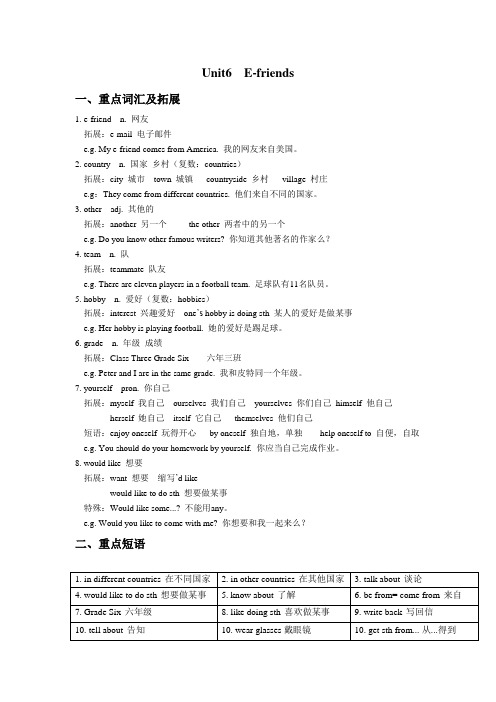
Unit6 E-friends一、重点词汇及拓展1. e-friend n. 网友拓展:e-mail 电子邮件e.g. My e-friend comes from America. 我的网友来自美国。
2. country n. 国家乡村(复数:countries)拓展:city 城市town 城镇countryside 乡村village 村庄e.g:They come from different countries. 他们来自不同的国家。
3. other adj. 其他的拓展:another 另一个the other 两者中的另一个e.g. Do you know other famous writers? 你知道其他著名的作家么?4. team n. 队拓展:teammate 队友e.g. There are eleven players in a football team. 足球队有11名队员。
5. hobby n. 爱好(复数:hobbies)拓展:interest 兴趣爱好one’s hobby is doing sth 某人的爱好是做某事e.g. Her hobby is playing football. 她的爱好是踢足球。
6. grade n. 年级成绩拓展:Class Three Grade Six 六年三班e.g. Peter and I are in the same grade. 我和皮特同一个年级。
7. yourself pron. 你自己拓展:myself 我自己ourselves 我们自己yourselves 你们自己himself 他自己herself 她自己itself 它自己themselves 他们自己短语:enjoy oneself 玩得开心by oneself 独自地,单独help oneself to 自便,自取e.g. You should do your homework by yourself. 你应当自己完成作业。
沪教版六年级上册英语Unit 9 Great cities of the world讲义(教师版)

Unit 9 Great cities of the world一、重点词汇及拓展1. capital n. 首都,大写字母词汇拓展:the capital of ......的首都the capital letter 大写字母e.g. Beijing is the capital of China. 北京是中国的首都。
2. north n. 北词汇拓展:in the north of ... 在......的北部northern adj. 北方的e.g. We live in the north. 我们居住在北方。
3. west n. 西部词汇拓展:east 东部western 西部的in the west of... 在......的西部e.g. Tibet is in the west of China. 西藏在中国的西部。
4. south n. 南词汇拓展:in the south of ... 在......的南部southern adj. 在...南方e.g. Wild geese fly to the south in autumn. 大雁在秋天飞向南方。
5. palace n. 王宫,宫殿词汇拓展:the Palace Museum 故宫Summer Palace 颐和园区分:place 地方e.g. The palace is very beautiful. 这个宫殿非常漂亮。
6. most n. 大多数;最多的(最高级)词汇拓展:many-more(更多的)-most区分:①most of the+名词复数大多数... ②most of+宾格...的大多数③most+名词复数大多数...e.g. Most of the students work hard. 大多数学生认真学习。
7. tourist n. 游客词汇拓展:tour 旅行观光tourism 旅游业e.g. Many tourists visit this place every year. 很多的游客每年参观此地。
沪教版小学英语语法及练习上课讲义

第1讲改否定句【知识点】1、句子中有am/is/are/can时,直接在后面加not,其他不变,抄下来;2、句子中没有am/is/are/can时,找到动词,在动词前面加don’t/doesn’t,其他不变,抄下来。
【练习题】1、I am Mike.否定句:____________________________________________________2、This is a pen.否定句:____________________________________________________3、You are a boy.否定句:____________________________________________________4、They can swim.否定句:____________________________________________________5、I like apples.否定句:____________________________________________________6、I am Danny.否定句:____________________________________________________7、This is my ruler.否定句:____________________________________________________8、Those are his robots.否定句:____________________________________________________9、You can go to have a look.否定句:____________________________________________________10、I know his name.否定句:____________________________________________________11、I am a student.否定句:____________________________________________________12、It is an apple.否定句:____________________________________________________ 13、They are my books.否定句:____________________________________________________ 14、I can see a boat.否定句:____________________________________________________ 15、Stand up.否定句:____________________________________________________ 16、I am in Grade 3.否定句:____________________________________________________ 17、She is Yang Ling.否定句:____________________________________________________ 18、We are teachers.否定句:____________________________________________________ 19、I can draw a toy car.否定句:____________________________________________________ 20、Jack speaks English very well.否定句:____________________________________________________第2讲改一般疑问句【知识点】1、句子中有am/is/are/can时,放句首,其他不变,抄下来。
- 1、下载文档前请自行甄别文档内容的完整性,平台不提供额外的编辑、内容补充、找答案等附加服务。
- 2、"仅部分预览"的文档,不可在线预览部分如存在完整性等问题,可反馈申请退款(可完整预览的文档不适用该条件!)。
- 3、如文档侵犯您的权益,请联系客服反馈,我们会尽快为您处理(人工客服工作时间:9:00-18:30)。
第1讲改否定句【知识点】1、句子中有am/is/are/can时,直接在后面加not,其他不变,抄下来;2、句子中没有am/is/are/can时,找到动词,在动词前面加don’t/doesn’t,其他不变,抄下来。
【练习题】1、I am Mike.否定句:____________________________________________________2、This is a pen.否定句:____________________________________________________3、You are a boy.否定句:____________________________________________________4、They can swim.否定句:____________________________________________________5、I like apples.否定句:____________________________________________________6、I am Danny.否定句:____________________________________________________7、This is my ruler.否定句:____________________________________________________8、Those are his robots.否定句:____________________________________________________9、You can go to have a look.否定句:____________________________________________________10、I know his name.否定句:____________________________________________________11、I am a student.否定句:____________________________________________________12、It is an apple.否定句:____________________________________________________ 13、They are my books.否定句:____________________________________________________ 14、I can see a boat.否定句:____________________________________________________ 15、Stand up.否定句:____________________________________________________ 16、I am in Grade 3.否定句:____________________________________________________ 17、She is Yang Ling.否定句:____________________________________________________ 18、We are teachers.否定句:____________________________________________________ 19、I can draw a toy car.否定句:____________________________________________________ 20、Jack speaks English very well.否定句:____________________________________________________第2讲改一般疑问句【知识点】1、句子中有am/is/are/can时,放句首,其他不变,抄下来。
2、句子中没有am/is/are/can时,用Do/Does放句首,其他不变,抄下来。
3、I变you,I am变Are you。
4、标点变问号。
肯定回答:Yes,人称+am/is/are/can/do。
否定回答:No,人称+am/is/are/can/do+not。
【练习题】1、I am Mike.一般疑问句:______________________________________________肯定回答:__________________________________________________否定回答:__________________________________________________2、This is a pen.一般疑问句:______________________________________________肯定回答:__________________________________________________否定回答:__________________________________________________3、You are a boy.一般疑问句:______________________________________________肯定回答:__________________________________________________否定回答:__________________________________________________4、They can swim.一般疑问句:______________________________________________肯定回答:__________________________________________________否定回答:__________________________________________________5、I like apples.一般疑问句:______________________________________________肯定回答:__________________________________________________否定回答:__________________________________________________6、I am Danny.一般疑问句:______________________________________________ 肯定回答:__________________________________________________ 否定回答:__________________________________________________ 7、This is my ruler.一般疑问句:______________________________________________ 肯定回答:__________________________________________________ 否定回答:__________________________________________________ 8、Those are his robots.一般疑问句:______________________________________________ 肯定回答:__________________________________________________ 否定回答:__________________________________________________ 9、You can go to have a look.一般疑问句:______________________________________________ 肯定回答:__________________________________________________ 否定回答:__________________________________________________ 10、I know his name.一般疑问句:______________________________________________ 肯定回答:__________________________________________________ 否定回答:__________________________________________________第3讲改肯定句【知识点】1、一般疑问句改肯定句(1)将句首的am/is/are/can放回主语后面,其它照抄,标点改成句号。
例如:Is she tall?She is tall.(2)句首是Do、Does的,去掉Do、Does,其它照抄,动词用原形,标点改成句号。
如果主语是第三人称单数,谓语也要改为第三人称单数形式。
例如:Do you like apples?肯定句:I like apples.2、否定句改肯定句(1)句子中有am/is/are/can时,直接把am/is/are/can后面的not去掉,其他照抄。
例如:I can’t run.I can run.(2)句子中有don’t或doesn’t时,直接去掉don’t或doesn’t,其他照抄。
如果主语是第三人称单数,谓语也要改为第三人称单数形式。
例如:Don’t shut.Shut.【练习题】1、Isthistallboythin?________________________________________________________2、Areyourearssmall?________________________________________________________3、Can Sarah clean the classroom?________________________________________________________4、Do you like the ducks?________________________________________________________5、Is this the playground?________________________________________________________6、Are you a boy?________________________________________________________7、Can they swim?________________________________________________________8、Does he like the dogs?________________________________________________________ 9、I am not a boy.________________________________________________________ 10、Sam isn’t sad.________________________________________________________ 11、We aren’t studying English.________________________________________________________ 12、I can’t dance________________________________________________________ 13、Don’t open the pencil-box.________________________________________________________ 14、He doesn’t know your name.________________________________________________________ 15、I am not Danny.________________________________________________________ 16、The man isn’t walking in the street.________________________________________________________ 17、They aren’t in the classroom.________________________________________________________ 18、Her mother can’t ride a bicycle.________________________________________________________ 19、We don’t have lunch at12:00 every day.________________________________________________________ 20、Tom doesn’t walk to school.________________________________________________________10、Do not stand up.缩写形式:____________________________________ 11、I’m Danny.完整形式:____________________________________ 12、This’s my ruler.完整形式:____________________________________ 13、Those’re his robots.完整形式:____________________________________ 14、You can’t go to have a look.完整形式:____________________________________ 15、I don’t know his name.完整形式:____________________________________ 16、I’m in Grade 3.完整形式:____________________________________ 17、She’s Yang Ling.完整形式:____________________________________ 18、We’re teachers.完整形式:____________________________________ 19、I can’t draw a toy car.完整形式:____________________________________ 20、Jack doesn’t speak English very well.完整形式:____________________________________10._______(我们的)classroom is big._______(你们的)classroom is small.11.________(他)often plays basketball after school.12._________(他的)teacher is good.(她的)teacher is good too.13.My book is blue._______(you)book is red.14.Our chair is better than _________(they)chairs.15.I will give the presents to __________(they)第6讲名词复数变化规则【知识点】名词复数变化规则:1、一般情况下,直接加s。
